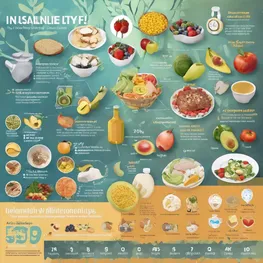Table of contents
- Unraveling the Mystery of Blood Sugar Levels
- How Your Diet Affects Blood Sugar Control
- Mastering the Art of Designing a Blood Sugar-Friendly Meal Plan
- Wholesome Meal Ideas to Maintain Blood Sugar Levels
- Discover the Key Lifestyle Changes for Blood Sugar Control
- Top Tips for effectively managing diabetes
Maintaining stable blood sugar levels is crucial for overall health, especially for individuals with diabetes or pre-diabetes. In this article, we have curated a week's worth of delicious and nutritious meals that are specifically designed to support stable blood sugar levels. From breakfast to dinner, you'll find a variety of recipes that not only taste amazing but also prioritize your well-being. Say goodbye to blood sugar spikes and hello to flavorful meals that keep you feeling satisfied and energized throughout the day.
Unraveling the Mystery of Blood Sugar Levels
Blood sugar levels, also known as blood glucose levels, refer to the concentration of glucose in the bloodstream. Glucose is the primary source of energy for the body's cells. Insulin, a hormone produced by the pancreas, helps regulate blood sugar levels. When blood sugar levels are too high, it can cause hyperglycemia, leading to symptoms such as increased thirst, frequent urination, and fatigue. On the other hand, low blood sugar levels, known as hypoglycemia, can result in dizziness, confusion, and even loss of consciousness. Maintaining stable blood sugar levels is crucial for overall health and the proper functioning of organs and tissues.
How Your Diet Affects Blood Sugar Control
A healthy diet plays a crucial role in controlling blood sugar levels. It helps maintain stable glucose levels, prevents spikes, delays the onset of diabetes complications, and promotes overall health and well-being.
Mastering the Art of Designing a Blood Sugar-Friendly Meal Plan
Mastering the Art of Designing a Blood Sugar-Friendly Meal Plan
- Include a balance of carbohydrates, proteins, and healthy fats in every meal.
- Choose low glycemic index foods, such as whole grains, legumes, and non-starchy vegetables, which help regulate blood sugar levels.
- Control portion sizes to prevent excess carbohydrate intake, as carbohydrates have the biggest impact on blood sugar.
- Spread meals evenly throughout the day to maintain stable blood sugar levels.
- Avoid sugary beverages and opt for water or unsweetened drinks instead.
- Incorporate fiber-rich foods like fruits, vegetables, and whole grains, as they slow down the absorption of glucose.
- Include lean sources of protein, such as poultry, fish, tofu, or beans, to help manage blood sugar levels.
- Limit the intake of processed and refined carbohydrates, such as white bread, sugary snacks, and sodas.
- Keep a food diary to track meals, monitor blood sugar levels, and identify patterns or triggers.
- Consult with a registered dietitian who specializes in blood sugar management for personalized guidance.
Wholesome Meal Ideas to Maintain Blood Sugar Levels
Maintaining blood sugar levels is crucial for overall health and well-being. One of the key components of a balanced diet is consuming delicious and nutritious recipes that are low in sugar and high in fiber. These wholesome meal ideas not only help regulate blood sugar levels but also provide essential nutrients and promote overall wellness.
- Baked Salmon with Roasted Vegetables: A flavorful dish that combines omega-3 rich salmon with fiber-packed roasted vegetables. This dish is not only low in sugar but also high in protein and healthy fats.
- Quinoa and Vegetable Stir-Fry: Quinoa is a healthy alternative to rice and is loaded with fiber and essential amino acids. Combine it with a variety of colorful veggies for a nutrient-packed meal that keeps blood sugar levels stable.
- Chicken and Broccoli Stir-Fry: Lean chicken breast paired with fiber-rich broccoli makes for a satisfying and low-sugar meal. Season with herbs and spices for added flavor without relying on added sugars or unhealthy sauces.
- Zucchini Noodles with Pesto: Replace traditional pasta with zucchini noodles to reduce carbohydrate intake and increase fiber content. Top with a homemade pesto sauce made from fresh herbs, garlic, and olive oil for a delicious and nutritious meal.
- Mixed Berry Smoothie Bowl: Blend a combination of berries with unsweetened almond milk for a refreshing and low-sugar breakfast or snack option. Top with sliced almonds and chia seeds for an extra boost of fiber and protein.
- Spicy Black Bean Soup: A hearty and nutrient-dense soup that is both low in sugar and high in fiber. This vegan-friendly dish combines black beans, tomatoes, spices, and vegetables for a satisfying and wholesome meal option.
Discover the Key Lifestyle Changes for Blood Sugar Control
In addition to diet, other lifestyle factors that can impact blood sugar levels include exercise and stress management. Regular physical activity helps to lower blood sugar levels by increasing insulin sensitivity and improving glucose uptake by the muscles. Exercise also helps with weight management and reduces the risk of developing insulin resistance. On the other hand, stress can increase blood sugar levels as it triggers the release of stress hormones like cortisol, which can interfere with insulin function. Therefore, effective stress management techniques such as relaxation exercises, meditation, and deep breathing can help keep blood sugar levels in check.
Top Tips for effectively managing diabetes
Managing diabetes and blood sugar levels is essential for living a healthy and fulfilling life. To help you in this journey, we have gathered insights from healthcare professionals who specialize in diabetes management. Here are their top tips for effectively managing diabetes:
- Monitor your blood sugar regularly.
- Follow a healthy and balanced meal plan.
- Stay physically active.
- Take medication as prescribed.
- Keep stress levels in check.
- Get enough quality sleep.
- Stay hydrated.
- Educate yourself about diabetes.
- Build a strong support system.
- Maintain a positive mindset.
In conclusion, a week's worth of delicious blood sugar-friendly meals is not only attainable but also essential for those looking to maintain stable blood sugar levels. With careful planning and the right ingredients, it is possible to create tasty and nutritious meals that won't cause sharp spikes or dips in blood glucose. Incorporating a variety of fruits, vegetables, lean proteins, and whole grains can provide a well-rounded and balanced diet. Additionally, portion control and mindful eating are crucial to ensuring optimal blood sugar control. By making small changes and experimenting with different recipes, individuals can take charge of their health while still enjoying delicious meals.
Frequently asked questions related to blood sugar friendly meals
What are blood sugar-friendly meals?
Blood sugar-friendly meals are meals that have a minimal impact on blood sugar levels. They typically include a balance of complex carbohydrates, lean proteins, and healthy fats to help maintain stable blood sugar levels.
Why is it important to have blood sugar-friendly meals?
Having blood sugar-friendly meals is important for people with diabetes or anyone looking to manage their blood sugar levels. These meals can help prevent spikes and dips in blood sugar, promote better energy levels, and support overall health.
What are some examples of blood sugar-friendly meals?
Some examples of blood sugar-friendly meals include grilled chicken with roasted vegetables, salmon with quinoa and steamed broccoli, turkey chili with beans and vegetables, and vegetable stir-fry with tofu.
Are blood sugar-friendly meals bland or boring?
Not at all! Blood sugar-friendly meals can be just as delicious and flavorful as any other meals. There are plenty of herbs, spices, and seasoning options available to add flavor without adding extra sugar or unhealthy ingredients.
Can blood sugar-friendly meals be enjoyed by the whole family?
Absolutely! Blood sugar-friendly meals are not only beneficial for those with diabetes or blood sugar concerns but can also be enjoyed by the entire family. They offer balanced nutrition and can contribute to overall well-being.







